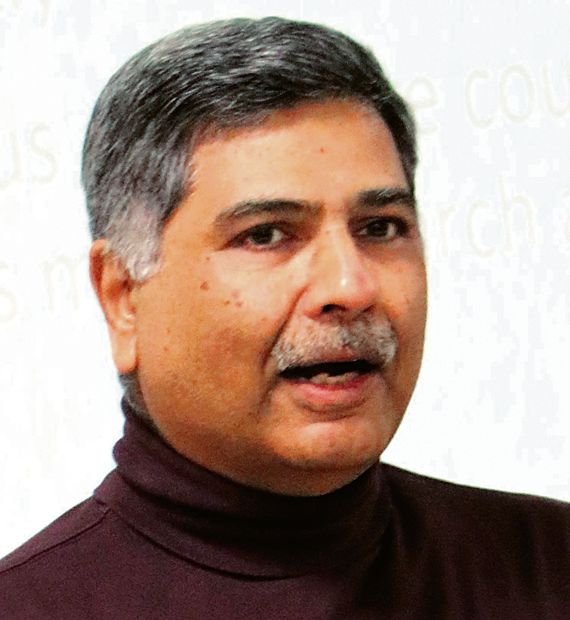Reopening trade with Pak will also help India
INDIA and Pakistan are at a near-historic low in their levels of mutual engagement. Born in 1947, these ‘Midnight’s Children’ have still not been able to overcome the trauma of their bloody and messy partition, despite the deep bonds between their people — evidence of what might have been and, indeed, what might be possible.
Trade, in the current context of their soured bilateral relationship, represents a low hanging fruit.
Since 2019, bilateral trade — which, in the past, withstood grave provocations — has been virtually halted, representing India’s reaction to the Pulwama terrorist attack and Pakistan’s reaction to the passage of the Jammu and Kashmir Reorganisation Bill.
India imposed a penal 200 per cent duty on Pakistani goods and Pakistan banned Indian imports. While the mutual recriminations — based on historical grievances — continue, there is a strong constituency in Pakistan that would like direct trade to resume (currently, most trade occurs via the indirect, Dubai route). It wants to shelve the more contentious issues for a later date.
Pakistan’s economy is in the throes of a crisis. It recently received the approval for a record 24th International Monetary Fund (IMF) support programme.
Trade with India in goods, services, tourism and energy should be of immense benefit. Exports, for example, could rise by as much as 80 per cent, a huge gain for a country constantly struggling with foreign exchange crises. Commodity trade with India could help dampen rampant inflation in food and electricity prices.
More generally, it is poor economics for Pakistan to not exploit the gains from deep engagement with the world’s fastest growing large economy (think Mexico and the US).
But, make no mistake. India’s gains will also be significant, and future gains even more so. Like Bangladesh, Pakistan could become a top market for Indian exports and source for tourism earnings.
Interestingly, Pakistan’s freelance workers have reportedly become a competitive source for Indian BPO (business process outsourcing) firms, owing to Pakistan’s rupee devaluation and the cultural affinity of the Pakistani and Indian workforce.
At full potential, trade can create millions of more stable and better quality jobs on both sides and could help create conditions for significant strategic gains. Both countries have troubled borders that are currently more challenging than their mutual border — Pakistan with Afghanistan and India with China. Neither would mind a quiet India-Pakistan border at this point. A dynamic, interdependent trading relationship can help sustain the current, uneasy border truce.
So, in the face of such obvious and potentially huge gains, what is holding back the resumption of a trade dialogue? Most Indians, even those in favour of trade with Pakistan, say that the Pakistani army exercises a veto, and will not allow such trade.
While at some points in the past, the Pakistani army may have vetoed a normal trade relationship with India, recent evidence is different. In 2021, the then army chief, General Qamar Javed Bajwa, called for a focus on geoeconomics and stable India-Pakistan relations.
Despite occasional violations, a fragile truce has prevailed at the border since 2021 — something that the Pakistani army could easily scuttle. The army is also concerned about Pakistan’s precarious economy and would likely be more amenable to a beneficial economic relationship with India.
At two meetings with development partners in recent months, where the military was present, the Pakistan government indicated that it is in favour of trade with India.
Finally, the government has invited Prime Minister Modi to the Shanghai Cooperation Organisation (SCO) meeting scheduled to be held in Islamabad from October 16-17. This outreach would have required the sanction of the army.
Besides this, there has been a chorus of voices, starting with Prime Minister Shahbaz Sharif, supporting trade resumption with India. Big business has repeatedly demanded trade normalisation, complaining about the high costs of indirect Indian imports routed via Dubai and Singapore.
If there is a consensus amongst the key Pakistani constituencies, where is the problem? Why does Pakistan not approach India with a formal proposal? Is Pakistan only waiting for a favourable “handshake moment” to propose the resumption of trade?
How might India react? Given that India never banned trade, it should be simpler for India to reciprocate diplomatic outreach by rolling back the penal import duty.
However, given the historical patterns of start and stop, India may be cautious about bilateral initiatives to restart trade discussions. It might prefer to talk on the sidelines of a larger meeting where the bilateral engagement is kept low key to minimise the domestic political impact of Pakistan possibly backing out at the last minute. At the same time, India should react positively to feelers/overtures from Pakistan, because it is in its own interest to do so.
The forthcoming SCO meeting in Islamabad — a non-bilateral setting — provides a possible opportunity for an India-Pakistan handshake since a senior official, Foreign Minister Jaishankar, is representing India.
The handshake can “merely” be a nod to begin talks soon on how and when to resume trade, keeping all other contentious issues on the side.
It could be a first, small step in liberating the two countries from being prisoners of the past.









